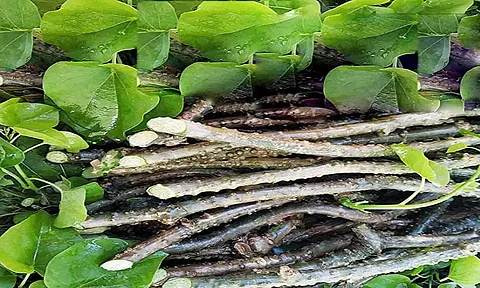
- Home
- Live Blog
- Breaking News
- Top Headlines
- Cities
- NE News
- Sentinel Media
- Sports
- Education
- Jobs

KOHIMA: The Council of Scientific and Industrial Research-North East Institute of Science and Technology (CSIR-NEIST), Jorhat is going in a big way to popularise the cultivation of medicinal and aromatic plants (MAP) in Northeast India under the 'CSIR Aroma Mission' programme. The CSIR laboratories have successfully completed the first phase of aroma mission, which is a flagship project of CSIR; and is actively supported and monitored by Prime Minister Narendra Modi.
In this endeavour, a team of scientists led by CSIR-NEIST Director, Dr G. Narahari Sastry met the Village Council of Nukshiyim village in Yaongyimsen, Mokokchung District in Nagaland led by Dr. I. Nukshi, its president. Together, they inaugurated a multi-locational trial and regional research experimental field, which is the first one in Nagaland.
Dr. Sastry underlined the importance of converting the rich biodiversity and abundant occurrence of rare medicinal and aromatic plants, for the benefit of the local people. The very reason to propagate MAP is to promote local rural entrepreneurship and augment the standard of living in the rural areas by encouraging this new alternative economic activity. Cultivation of medicinal plants and herbs which boosts immunity and develops resistance to fight infectious diseases by promoting the general health of population is of outstanding importance he added.
Further, the high value of aromatic plants and fragrant flowers due to their rich possession of natural oils is ideal for a profitable business and can be effectively linked to the perfumery industry. Such steps can pay rich dividends to farmers, said Dr Sastry, adding that the CSIR along with other organizations have embarked on this mission. Directed towards the cultivation of MAP, the mission is likely to augment the earnings of the people living below the poverty line who can be trained to adopt this new means of livelihood.
The CSIR-NEIST has undertaken the plan of setting up of about 15 multi-locational experimental research fields in the North East Region (with five farms in Assam; four in Arunachal Pradesh; one each in Manipur, Nagaland, Meghalaya, Mizoram, Sikkim and Tripura). This will significantly help in the realization of the vision of Prime Minister Narendra Modi to double the farmers' income in the next few years. This initiative is also an echo of his clarion call of 'Atmannirbhar Bharat Abhiyan" which translates to 'self-reliant India'.
The principle approach is to ensure identification, domestication, and cultivation of rare, threatened and endangered species of medicinal plants to not only sustain the modern pharmaceutical industries but also for sustenance of India's strong traditional system of medicines. For this to happen, the crucial factors that hold the key are breeding of new plant varieties and identification of stable performance through multi-locational trials besides the integration of modern science along with market and industrial application potential.
The high scale production of these medicinal plants will be beneficial to meet the industrial demands as well as cease the import of the raw materials further boosting the country's economy.
The team of scientists comprises Dr S.P. Saikia Principal Investigator, CSIR Aroma Mission; Dr Mohan Lal, Co-Investigator; Ilika Zhimo, Senior Scientist; and Himangshu Lekhak.
CSIR-NEIST Director, DrSastry handed over the saplings of Tinospora Cordifolia (Giloy) (which is a powerhouse of antioxidants and boosts the immunity levels) to the president of Nukshiyim Village Council, I. Nukshi, its secretary S. Wati, and other members namely L.T. Nokdang, Taikaba, K. Nungshi, Sunggekumba, M. LendiAo, and Sashimeran. During this trip, DrSastry also distributed several medicinal plants, face masks, anti-arthritis ointments and hand sanitizers prepared by CSIR-NEIST, stated a release.